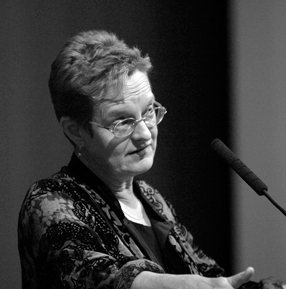What He Thought
For Fabbio Doplicher
We were supposed to do a job in Italy and, full of our feeling for ourselves (our sense of being Poets from America) we went from Rome to Fano, met the Mayor, mulled a couple matters over. The Italian literati seemed bewildered by the language of America: they asked us what does “flat drink” mean? and the mysterious “cheap date” (no explanation lessened this one’s mystery). Among Italian writers we could recognize our counterparts: the academic, the apologist, the arrogant, the amorous, the brazen and the glib. And there was one administrator (The Conservative), in suit of regulation gray, who like a good tour guide with measured pace and uninflected tone narrated sights and histories the hired van hauled us past. Of all he was most politic— and least poetic— so it seemed. Our last few days in Rome I found a book of poems this unprepossessing one had written: it was there in the pensione room (a room he'd recommended) where it must have been abandoned by the German visitor (was there a bus of them?) to whom he had inscribed and dated it a month before. I couldn’t read Italian either, so I put the book back in the wardrobe’s dark. We last Americans were due to leave tomorrow. For our parting evening then our host chose something in a family restaurant, and there we sat and chatted, sat and chewed, till, sensible it was our last big chance to be Poetic, make our mark, one of us asked “What’s poetry? Is it the fruits and vegetables and marketplace at Campo dei Fiori or the statue there?” Because I was the glib one, I identified the answer instantly, I didn’t have to think— “The truth is both, it’s both!” I blurted out. But that was easy. That was easiest to say. What followed taught me something about difficulty, for our underestimated host spoke out all of a sudden, with a rising passion, and he said: The statue represents Giordano Bruno, brought to be burned in the public square because of his offence against authority, which was to say the Church. His crime was his belief the universe does not revolve around the human being: God is no fixed point or central government but rather is poured in waves, through all things: all things move. “If God is not the soul itself, he is the soul OF THE SOUL of the world.” Such was his heresy. The day they brought him forth to die they feared he might incite the crowd (the man was famous for his eloquence). And so his captors placed upon his face an iron mask in which he could not speak. That is how they burned him. That is how he died, without a word, in front of everyone. And poetry— (we’d all put down our forks by now, to listen to the man in gray; he went on softly)— poetry is what he thought, but did not say.
Credit
From Hinge & Sign: Poems 1968-1993, published by Wesleyan University Press, 1994. Copyright © 1994 by Heather McHugh. Reprinted with permission.
Date Published
01/01/1994

